Using Dialogue to Your Advantage
by Jan Drexler
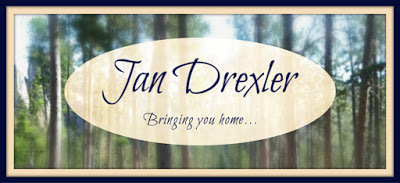
Every story needs dialogue, right?
But if dialogue isn’t used well, it can be a liability to your story. A space-filler. Nothing but a word-count booster. We want to avoid useless conversations in our stories at all costs!
Dialogue can be strong, bringing clarity to our characters and our scenes, but dialogue can also be a pitfall.
What are some of the liabilities of dialogue?
1) Dialogue can take the place of action.
2) Dialogue can take the reader and the characters around in aimless circles.
3) Dialogue can stop story progression in its tracks.
...unless we, as authors, take control of those liabilities and use dialogue to help our stories sing.
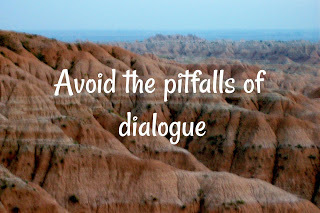
How can you make sure your dialogue adds to your scene rather than bogs it down?
The trick is to have your character’s goal in the forefront at all times – but this is easier said than done, right? I find it helpful to write out my character’s goal, conflict, and the disaster for each scene before I start writing it and post it on my computer screen, or my desk, or my planner - someplace that keeps it in front of me while I write..
Here’s an example from my Work in Progress, a cozy mystery. Emma, the main character, and sleuth in the story, has discovered a body in her room at the Sweetbriar Inn B&B where she’s working. Her goal is to clear her name, the conflict is that the evidence is against her, and the disaster is that Deputy Cal ends up accusing her of murder.
The biggest advantage to using dialogue is that it adds movement to your scenes – a give and take between the characters that can highlight personalities.
The style of dialogue can add something else to your scene. In the example above, I used a back and forth style with short sentences like bullets. Very little introspection. Tension that rises and falls. This (I hope) keeps the reader involved in the action, present with Emma as she experiences the interview.
I wanted to keep this interview casual, more like a conversation between friends than an interrogation. If I wanted Cal to be an antagonist, I could have made his questions even shorter and have him pound each statement in like a rivet.
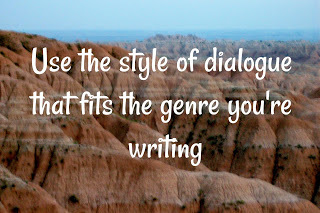
In a romance, I tend to use dialogue with more tags, descriptors, and introspection. Here’s an example from “Softly Blows the Bugle,” my October release from Revell. In this genre I use a different kind of scene structure – one that reveals Aaron’s goal (to leave Weaver’s Creek as soon as he can,) his motivation (to escape the memories of the war,) and his conflict (fighting against his own Amish background.) The conflict doesn’t appear until the end of the scene, left out of this excerpt.
In this scene the dialogue is drawn out. Longer sentences, a lot of introspection. This kind of dialogue helps to set the tone for the story.
Even though this dialogue is very different from the scene in my cozy mystery, it still moves the story along. But notice how the dialogue tags and actions make a difference in how the scene reads. As authors, we can use dialogue styles to control the pacing of the story, the mood of the story, and even the genre.
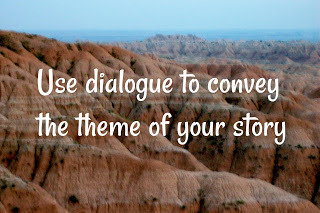
Another use for dialogue in your story is to convey the theme. Not sure what the theme of your book is? Listen to your characters as they speak. Sometimes they'll surprise you by revealing the theme.
One of the best examples of this happening is in this scene from The Fellowship of the Ring by J.R.R. Tolkien. Even in the movie version, the theme comes through powerfully.
Now it's your turn. Do you enjoy writing dialogue, or does the idea of it turn your brain into oatmeal? How have you used dialogue to your advantage - or how have you seen dialogue used well in a book you've read?
And by the way, "Softly Blows the Bugle" is available for preorder!
Even if you aren't able to order the book at this time, would you do me a favor and put it on your "want to read" list at Goodreads? Here's the link: Goodreads
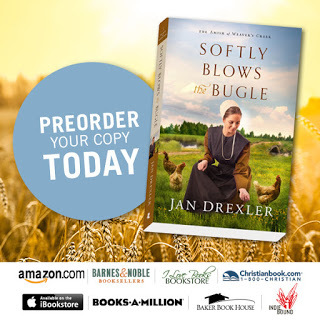

Every story needs dialogue, right?
But if dialogue isn’t used well, it can be a liability to your story. A space-filler. Nothing but a word-count booster. We want to avoid useless conversations in our stories at all costs!
Dialogue can be strong, bringing clarity to our characters and our scenes, but dialogue can also be a pitfall.
What are some of the liabilities of dialogue?
1) Dialogue can take the place of action.
2) Dialogue can take the reader and the characters around in aimless circles.
3) Dialogue can stop story progression in its tracks.
...unless we, as authors, take control of those liabilities and use dialogue to help our stories sing.

How can you make sure your dialogue adds to your scene rather than bogs it down?
The trick is to have your character’s goal in the forefront at all times – but this is easier said than done, right? I find it helpful to write out my character’s goal, conflict, and the disaster for each scene before I start writing it and post it on my computer screen, or my desk, or my planner - someplace that keeps it in front of me while I write..
Here’s an example from my Work in Progress, a cozy mystery. Emma, the main character, and sleuth in the story, has discovered a body in her room at the Sweetbriar Inn B&B where she’s working. Her goal is to clear her name, the conflict is that the evidence is against her, and the disaster is that Deputy Cal ends up accusing her of murder.
The deputy at the door buzzed me right through to Cal’s office.
“You must have been expecting me.” I sat in the brown vinyl upholstered chair across the desk from him.
“Becky texted me with your ETA,” he said, sitting behind his desk with the ever-present toothpick firmly in the corner of his mouth. “Can I get you anything? Coffee?”
“No thanks. I have my water with me.” I always carried a bottle of Evian in my bag, a habit left over from traveling in foreign countries on a regular basis.
“Then we’ll get started.”
Cal shuffled through some papers on his desk. He found a blank tablet and a pen, then looked at me.
“For the record, I need your full name and address.”
“Emma Blackwood.” I hesitated. “Do you want my Chicago address, or the inn?”
“The inn is good enough.” He wrote it down, then glanced at me. “What time did the victim arrive at your suite?”
“Victim? Then he really was murdered? I hoped it had been an accident.”
Leaning his elbows on his desk, Cal looked at me. “Ms Blackwood, this is an interview. I ask the questions and you answer them. Understand?”
“It’s Emma.” I squirmed in my seat. “Am I a suspect?”
“Like I said last night, everyone is a suspect at this point.” He drew a circle on his tablet. “How long have you known the victim?”
“I don’t know him. I’ve never seen him before.”
“Then what was he doing in your suite?”
“I don’t know.” And I wasn’t about to begin speculating.
“What time did you leave your room?”
“At seven in the morning.”
He wrote the time inside the circle and drew lines across it as if he was cutting a pie. “You didn’t return at all during the day?”
“We were busy all day getting ready for the guests to arrive.”
He made a note in another pie shape. “What did that entail, exactly?”
I took a deep breath. “I made sure all the beds were made with freshly laundered sheets, and fresh towels and linens were available in every room. I checked to see if the plumbing was working properly and that every room was clean. Then I made sure the common areas were ready to go. In the afternoon I took an inventory of the storeroom and took Rose’s dog for a walk before the first guests arrived.”
“What time was that?”
“Clara was the first, and she arrived just after three o’clock. Rose had picked her up at the airport and brought her to the inn.”
More notes.
“What time did Rose leave for the airport?”
I thought back. “It was after lunch. Probably around twelve-thirty.”
“Who else was at the inn before the guests arrived?”
“Just Wil.” I remembered the scones. “And Becky must have come by sometime to deliver the scones for afternoon tea, but I didn’t see her.”
“When did Mr. Brill show up?”
“I never saw him.”
“Right.” Cal made another note. “What about the wine glasses?”
“The wine glasses?” An image of two wine glasses on a tray flashed through my memory. “I didn’t see them before you came and we took you upstairs to see the body.”
Cal stared at me, bouncing the end of his pen on his tablet. “They weren’t there when you first discovered the body?”
I shut my eyes. I saw the shoes, the dim room, Tim meowing…
“No, I didn’t see them then. Only when you came back to the room with us, after Wil called you.”
“And how much time passed between finding the body and when Wil called?”
“It was at least half an hour. Maybe closer to forty-five minutes. It seemed like it was forever. I waited until all the guests had left for the evening before I told Rose about the man in my room.”
Cal bounced his pen again.
I shifted in my seat. “Is there something you haven’t told me?”
“After further examination, the coroner determined that Dick Brill’s body was moved post-mortem.”
My head swirled. “What?”
“Somebody moved him after he was dead. Perhaps someone planted his body in your room to throw suspicion on you.” He leaned back in his chair, watching me. “Unless, of course, you’re the one who moved him.”
“Why would I do that?”
“To cover up the fact that a man died in your suite. Maybe you intended to get rid of the body later.”
“But then why would I tell Rose? Why would I have Wil call you?”
He shrugged. “Maybe you got cold feet.”
My stomach churned. I began to wish I hadn’t eaten a second peach muffin.
Cal leaned on his desk again, his dark brown eyes boring into mine.
“Emma, did you murder Dick Brill?”
The biggest advantage to using dialogue is that it adds movement to your scenes – a give and take between the characters that can highlight personalities.
The style of dialogue can add something else to your scene. In the example above, I used a back and forth style with short sentences like bullets. Very little introspection. Tension that rises and falls. This (I hope) keeps the reader involved in the action, present with Emma as she experiences the interview.
I wanted to keep this interview casual, more like a conversation between friends than an interrogation. If I wanted Cal to be an antagonist, I could have made his questions even shorter and have him pound each statement in like a rivet.

In a romance, I tend to use dialogue with more tags, descriptors, and introspection. Here’s an example from “Softly Blows the Bugle,” my October release from Revell. In this genre I use a different kind of scene structure – one that reveals Aaron’s goal (to leave Weaver’s Creek as soon as he can,) his motivation (to escape the memories of the war,) and his conflict (fighting against his own Amish background.) The conflict doesn’t appear until the end of the scene, left out of this excerpt.
Footsteps in the grass behind him. Aaron turned to see Jonas. Ever since they had met in the hospital after one of the many battles in the Siege of Petersburg in October, Jonas had been the one to keep Aaron’s path straight. But it wouldn’t be long before they would go their separate ways. How did he ever come to be friends with a Yankee?
“Are you feeling all right?” Jonas rested his arms on the fence rail next to him.
“You aren’t a medic anymore.”
Jonas gave a soft chuckle. “It has become a habit.” He rolled his shoulders. “It feels good to be home, but . . .”
Aaron let the silence grow between them.
He sighed. “It isn’t what you remembered?”
“It’s still home, but not much has changed. It is as if the war didn’t happen at all.”
“But the war changed you.” Aaron let his mind go back to the angry, fiery young man he had been, hot to kill any Yankee he could find after a scouting party shot Grandpop and left him to die with his blood seeping into the Tennessee land he had loved. “Both of us. War will do that.”
Jonas looked out over the meadow. “You’re right. We’ve both seen things that Katie and my family can’t fathom. And I don’t want to tell them. I don’t want Katie to know how terribly cruel men can be.”
“Do you still think war is wrong?” Aaron looked at his friend. “Your side won. The Confederacy is dead.”
“And the slaves are free.” Jonas bowed his head. “But the cost . . . The cost is so great. I was willing to give my life so others could be free, but when I think of how many others paid the ultimate price, it grieves me.” He passed a hand over his face. “Yes, I believe war is wrong. I pray that our country will never be in another one.”
After a few minutes of silence, Jonas changed the subject.
“What do you think of my family?”
Aaron let a smile tug at the corners of his mouth. “You described each one perfectly. Except your sister Elizabeth. I wouldn’t have been able to choose her out of a crowded hog wallow if I didn’t hear your mama say her name.”
“Elizabeth is different than I remember, but she didn’t spend much time with the family when her husband was alive.”
Aaron leaned on the fence post, easing the weight pressing on his good leg. “She’s a widow?”
“Mamm said Reuben was killed at Vicksburg.”
“I thought you said that the Amish don’t fight.”
“Reuben wasn’t Amish.”
Aaron shifted again to ease his aching leg. Elizabeth was a puzzle, but he wouldn’t be around long enough to sort it out.
In this scene the dialogue is drawn out. Longer sentences, a lot of introspection. This kind of dialogue helps to set the tone for the story.
Even though this dialogue is very different from the scene in my cozy mystery, it still moves the story along. But notice how the dialogue tags and actions make a difference in how the scene reads. As authors, we can use dialogue styles to control the pacing of the story, the mood of the story, and even the genre.

Another use for dialogue in your story is to convey the theme. Not sure what the theme of your book is? Listen to your characters as they speak. Sometimes they'll surprise you by revealing the theme.
One of the best examples of this happening is in this scene from The Fellowship of the Ring by J.R.R. Tolkien. Even in the movie version, the theme comes through powerfully.
Now it's your turn. Do you enjoy writing dialogue, or does the idea of it turn your brain into oatmeal? How have you used dialogue to your advantage - or how have you seen dialogue used well in a book you've read?
And by the way, "Softly Blows the Bugle" is available for preorder!
Even if you aren't able to order the book at this time, would you do me a favor and put it on your "want to read" list at Goodreads? Here's the link: Goodreads

When Elizabeth Kaufman received the news of her husband's death at the Battle of Vicksburg in 1863, she felt only relief. She determined that she would never be at the mercy of any man again, even if it meant she would never have a family of her own. Then Aaron Zook comes home with her brother when the war ends two years later.
Despite the severity of his injuries, Aaron resolves to move West and leave the pain of the past behind him. He never imagined that the Amish way of life his grandfather had rejected long ago would be so enticing. That, and a certain widow he can't get out of his mind.
Yet, even in a simple community, life has a way of getting complicated. Aaron soon finds that while he may have left the battlefield behind, there is another fight he must win--the one for the heart of the woman he loves.Welcome back to the Amish community at Weaver's Creek, where the bonds of family and faith bind up the brokenhearted.
Published on July 19, 2020 21:00
No comments have been added yet.



